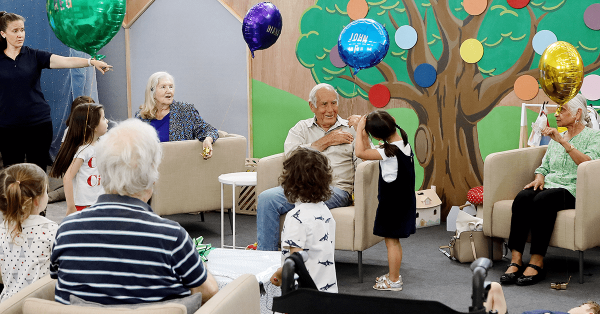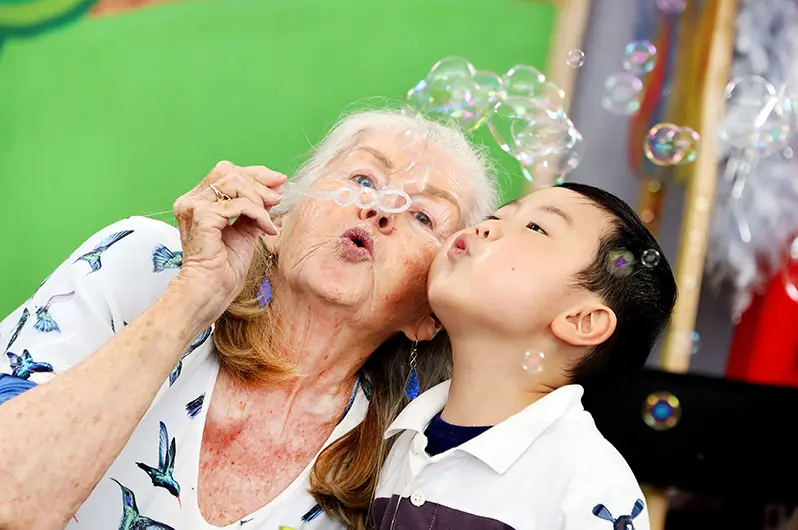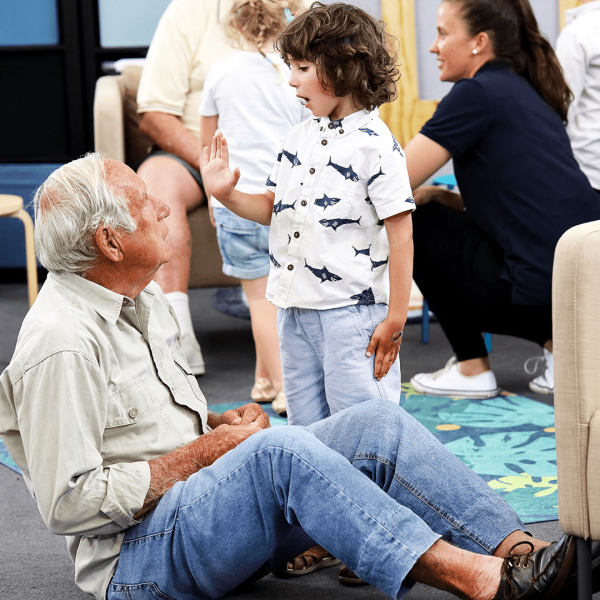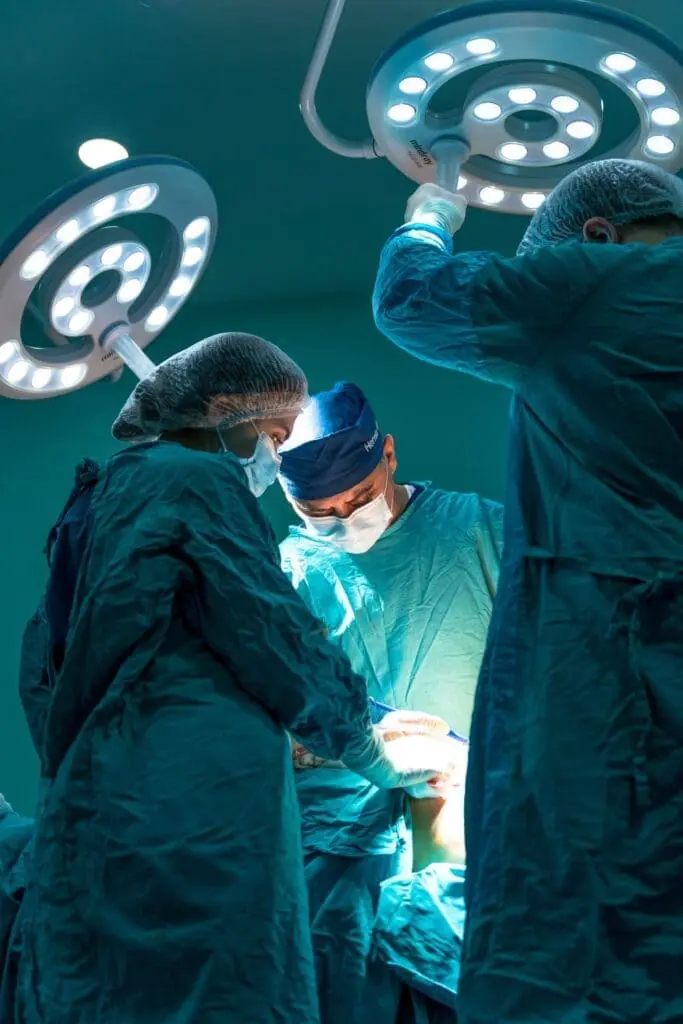
In 2019 the heart-warming documentary series ‘Old People’s Home for 4-Year-Olds’ took the nation by storm. Through this unique social experiment, the show highlighted the benefits of implementing an inter-generational care model that not only had benefits for older people but for children too.
However, what very few people know is that the research that underpins the show was possible because of a bequest left by an incredibly generous and vibrant woman – the late Doris Whiting. The late Doris Whiting who was a former patient of the lead geriatric expert for the show, Professor Susan Kurrle, left a generous bequest in 2005 to help support Professor Kurrle’s research.
The show took place in a specially designed pre-school which was purpose-built within an aged care home to facilitate the intergenerational care model being implemented. Every day for seven weeks, the social experiment brought 11 elderly Australians and 10 pre-schoolers together to participate in planned, varied activities aimed at improving the physical and mental health of the older participants.
Although seemingly light-hearted and fun the show is underpinned by innovative medical research into geriatric health. Overseen by a team of experts the experiment into geriatric health and wellbeing tracked and analysed the model of care by measuring physical and mental changes among the older people. This included factors like mobility, handgrip strength, walking speed, depression and general sociability.
Although it was expected that we would see a positive impact for the older participants, an unexpected outcome was just how much the developmental growth of the children involved improved. There was a marked improvement in the communication styles and capabilities of the children as well as their confidence in social situations.
Who was Doris Whiting?
Doris, a resident of Northern Sydney, was a consumer advocate on a number of committees overseeing care for older people. It was an area close to her heart and she felt that the research done by the Rehabilitation and Aged Care Service at Hornsby Ku-ring-gai Hospital was very important for older people’s health and well-being. Doris experienced the Rehabilitation and Aged Care Services of the hospital both as a patient herself and when her husband was unwell. She was extremely grateful for the support and care they received and was passionate about ensuring it continued to be available to those who needed it most. She believed in the research of Professor Kurrle and her colleagues and her ability to make a change – this motivated her to leave a generous bequest upon her passing in 2005.
Doris’ gift enabled research into better understanding dementia, identifying pre-frailty, and the assessment and management of frailty in acute hospital wards. The gift also provided funding for a literature review of intergenerational care which has underpinned ongoing research, and has ultimately led to the development of the ABC docuseries Old People’s Home for 4-year-olds.
Australia’s ageing population
It is no secret that Australia has an ageing population – with the Northern Sydney Local Health District having the fastest ageing population in the nation. Our current aged-care facilities and care models do not always provide our older people with an environment that maintains their physical and mental function in order to ensure a better quality of life.
Over half of those moving into aged care facilities suffer from depressive symptoms compared with just 10% of the general population. In addition to this, around 40% of residents receive no visitors. This means that many of the residents spend up to 18 hours a day alone in their room, leading to deep-seated feelings of loneliness.
Professor Kurrle’s research focuses on addressing some of these challenges through the implementation of an intergenerational care model. The documentary ‘Old People’s Home for 4-year old’s’ incorporates the research of Professor Kurrle and colleagues, and provides measurable outcomes and evidence that this model can benefit older people. And have them healthier, happier, and more connected in the later years of their lives.
“To make a positive change for people in aged care, we needed evidence that intergenerational care can work in this country. We hope that our experiment will provide the evidence needed to see this model of care adopted much more widely. Older people were young once, and hopefully, seeing these four-year-olds will draw them out of themselves,” explains Professor Kurrle.
And the show did just that; providing good evidence that intergenerational care programs promote participation and social connectedness increasing happiness, dignity, and self-esteem. There was an improvement in both older and younger participants’ motor and cognitive skills as well as improved language skills and self-confidence.


Why intergenerational care is the way forward.
Although documentary shows like this can often have scripting elements, this was not the case for ‘Old People’s Home for 4-year-olds’. All of the interactions were real. That’s why we had the opportunity to view moments of tension and discomfort between the participants as they developed their understanding of one another.
“There was no scripting; this was a social experiment. It all happened, and the goal was to look at the interactions and results and then evaluate them. We conduct objective measures at the beginning and the end – accepted measures that show if there was an improvement or not. I was sure it would be positive for some [residents], but you never truly know until you bring people together.”
It was clear to viewers that the older participants found it challenging to adjust initially and even at times throughout the seven weeks. By the end, the results showed that the participants had noticeable improvements ranging from improved mobility to better grip strength. In some cases, their mood improved, but their outlook on life was also much more positive.
Somewhat more surprising to viewers and experts alike was the measurable changes this experiment had on the children.
In addition to an increase in confidence, there were noticeable improvements in language, specifically the children’s ability to describe both their own and others’ psychological states. Observations indicated that through their interaction with their older friends, the children had learnt to understand social interactions better and improve their understanding of others.
Professor Kurrle genuinely believes intergenerational care has the power to change aged care and improve quality of life and health outcomes.
“I think what we want to do is say to all the aged care organisations that you can do this. There are many different ways to do it, and there is good evidence on why to do it.”
The program has created a greater understanding of aged care within the community. The show encourages people to think differently about older people moving into care facilities. Through this increased awareness, the program can now be a catalyst for change. More people will now ask aged care providers, educators, and the government to integrate an intergenerational care model into aged care facilities nationwide.
The program went on to win an International Emmy for best Non-Scripted Entertainment in late 2020, showing the impact that the program had internationally. Series 2 of ‘Old People’s Home for 4-Year-Olds’ has just recently been televised on ABC, and once again the reaction to it has been very positive.
Doris’ generous bequest is a perfect example of the power of gifts in Will and how such an investment can positively change patient care and quality of life for the future. Leaving a legacy gift is a deeply personal choice that has the ability to impact generations to come by supporting your hospitals and healthcare services within the Northern Sydney Local Health District.
If you are interested to learn more about how you can leave a gift in your Will to support the NORTH Foundation or one of our beneficiaries, please click here. Alternatively, you can contact us on (02) 9436 0162 or email
